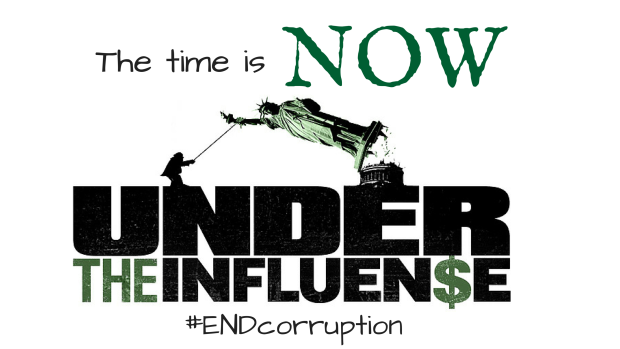http://www.nybooks.com/articles/archives/2015/jun/04/how-money-runs-our-politics/
http://www.washingtonpost.com/blogs/the-fix/wp/2014/04/23/bob-dole-says-the-republican-party-is-way-more-conservative-than-it-was-even-20-years-ago-hes-right/
http://talkingaboutmoneyin2016.tumblr.com/candidates
You know things are not right when a former majority leader and Republican Senator from Kansas thinks we should stop this money in politics. He said he is troubled by the amount of money that is being spent on political campaign. Dole, the GOP's presidential nominee in 1996, said in a recent
interview for AARP Bulletin that campaign spending gone out of hand.
What has been the biggest change in presidential politics since you were the Republican nominee in 1996?
Money. Now they talk about raising $1 billion to run for president. It's unreal. We need to do something to stop all this money in politics. I've always believed when people give big money, they — maybe silently — expect something in return.
Do you think you could have been the nominee if money had played such an important role back then?
I don't think so. And I might not be conservative enough to be the nominee today.
Whether you agree with his politics or not, he is right about the current state of the presidential campaign. Not only that, he also concerns about the recent polarization within the congress and how his Republican Party is no longer the party that he used to know as we can see
this editorial written by The New York Times staffs:
“It seems to be almost unreal that we can’t get together on a budget or legislation,” said Mr. Dole, the former Senate majority leader and presidential candidate. “I mean, we weren’t perfect by a long shot, but at least we got our work done.”
The current Congress can’t even do that, thanks to a furiously oppositional Republican Party, and that’s what has left mainstream conservatives like Mr. Dole and Senator John McCain shaking their heads in disgust.
Senators Marco Rubio and John McCain last month, two Republicans at odds over how to deal with the federal debt.Approach to Debt Widens Rift Among G.O.P. SenatorsMAY 24, 2013
The difference between the current crop of Tea Party lawmakers and Mr. Dole’s generation is not simply one of ideology. While the Tea Partiers are undoubtedly more extreme, Mr. Dole spent years pushing big tax cuts, railing at regulations and blocking international treaties. His party actively courted the religious right in the 1980s and relied on racial innuendo to win elections. But when the time came to actually govern, Republicans used to set aside their grandstanding, recognize that a two-party system requires compromise and make deals to keep the government working on the people’s behalf.
The current generation refuses to do that. Its members want to dismantle government, using whatever crowbar happens to be handy, and they don’t particularly care what traditions of mutual respect get smashed at the same time. “I’m not all that interested in the way things have always been done around here,” Senator Marco Rubio of Florida told The Times last week.
Tom Mann of the Brooking Institute and Norm Ornstein of the American Enterprise Institute released a book in the spring of 2012 called: "“It’s Even Worse Than It Looks: How the American Constitutional System Collided With the New Politics of Extremism". In an essay taken from the book, the duo wrote:
We have been studying Washington politics and Congress for more than 40 years, and never have we seen them this dysfunctional. In our past writings, we have criticized both parties when we believed it was warranted. Today, however, we have no choice but to acknowledge that the core of the problem lies with the Republican Party.
The GOP has become an insurgent outlier in American politics. It is ideologically extreme; scornful of compromise;unmoved by conventional understanding of facts, evidence and science; and dismissive of the legitimacy of its political opposition.
When one party moves this far from the mainstream, it makes it nearly impossible for the political system to deal
(You could read more further on how polarization got so heavy in Washington in this article
here)
All of them have this connections between big donors' demands in Washington and their endorsed candidates from both parties. Republican Presidential candidate Lindsay Graham sponsored a bill that will ban internet gambling in the Senate when his big supporter and donor, Sheldon Adelson, a billionaire casino owner, asked him to do so in order to get rid of competitors. Big donors like Alice Walton of Walmart and big Israel supporter Haim Saban from Democratic side, in other hand, already got Hillary Clinton in their pocket and push her to have policies that could benefit them not only financially, but also their personal interest like agreeing with her political opponents' Israeli policies.
This is one big disconnect between their voters and candidates. They spent most of the time through raising campaign money form their big donors and only meet their voters through the candidate's donor-sponsored small speeches, rather than talk with them face to face. That's what Bernie Sanders did with his supporters:
gathering up ten thousand people in Madison, Wisconsin last week - maybe the biggest in 2016 election.
Big money in politics is one of biggest issues we must talk about during 2016 elections. Candidates from
both parties have discussed about reforming the government and some of them, including Republicans, willingly support campaign finance reform.
This is not a partisan issue - but BIPARTISAN issue. We must act now. We must return to the time Bob Dole used to familiar with.
